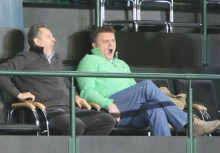In the late 2000s, still in the Yanukovych era, an acquaintance of mine sought contact with a new party project which, once launched, was boosting its rating thanks to the image of the party leader, a brilliant world-famous Ukrainian boxer at the time.
Before joining, the acquaintance wanted to weigh everything (ideology, policies, plans) and obtain information from the party leader’s mouth.
He was told he could meet other competent people, but he wanted to speak to the leader.
They explained to him that the leader was the party’s face, while “another man” was the party’s boss.
As time went by, just about everyone commented on a vertical chain: Semen Mohylevych, a crime honcho whom the US FBI had failed to catch for more than 10 years, and the godfather of Firtash’s business (at the time of RosUkrEnerho); Dmytro Firtash himself, a financier and a brand-new oligarch who began to actively fund Ukrainian politics (parties, factions, elections, candidates, and ministers); and Serhii Liovochkin, head of the Presidential Administration, manager of new political projects – both pro-governmental and (just in case) oppositional.
Vitali Klitschko’s Maidan activities showed that he lacked a political image and proper qualities for being president.
Petro Poroshenko had no guarantees of going through to the second round if Klitschko was also running for the presidency. Nor did he have a nationwide party network.
The Vienna meeting shaped a victorious coalition: the UDAR party lays the groundwork for Poroshenko’s presidential campaign and then receives his support and a sufficient quota on the Petro Poroshenko Bloc’s parliamentary election list. Klitschko becomes the mayor of Kyiv.
A part of former Regionnaires gets the green light in south-eastern first-past-the-post constituencies, and the other (“cleaned up”) one, led by Liovochkin and Boiko and funded by Firtash, is elected to parliament as Opposition Bloc.
What is the political future of the Vienna alliance? Joint voting on important bills? Situational mutual help? Cooperation in the local south-east elections? Or will UDAR go separately from the PP Bloc?
It is important who represented Moscow in Vienna – Surkov or somebody else.
For after a single-round presidential campaign, the winner announced a speedy end to the war. But the latter could only be finished either by a splendid victory or by a deal with Putin.
The current level of conflict frozenness within the limits of Ukrainian control is the result of bilateral Russian-Ukrainian agreements. But neither Mohylevych, nor Firtash, nor Liovochkin have any impact on front-line developments.
Wealth breeds boredom. They are bored… Firtash and Liovochkin at a basketball match.







